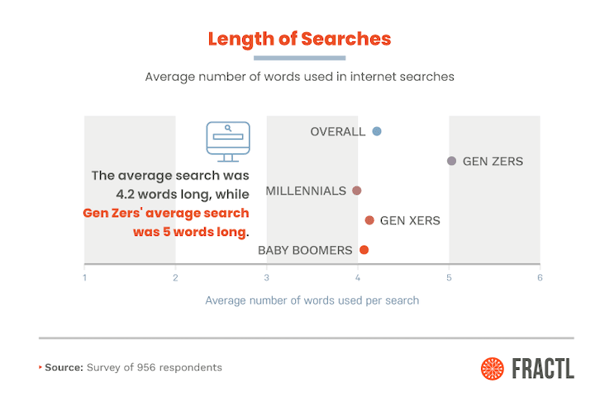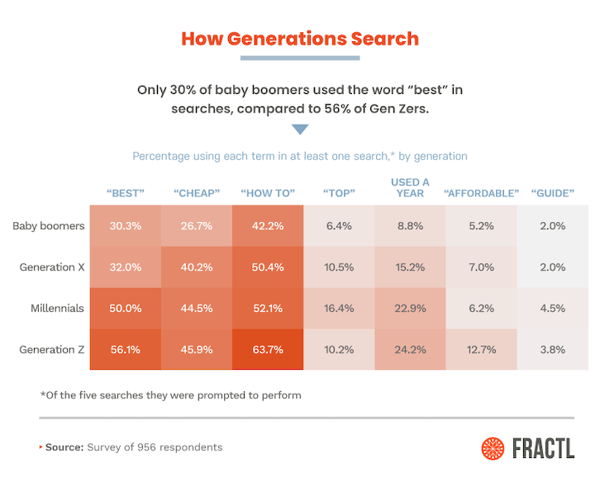Your age can greatly influence things like your taste in movies, music, and food, but did you know it can also affect how you search on the internet?
I, myself, am a Millennial and I know I don’t surf the internet the same way my mom, a Baby Boomer does.
But, why is this important to businesses?
If you familiarize yourself with the search intent of your audience you can be more prepared to produce quality content to make sure you are speaking to what is important to them.
Fractl took the first step toward this by focusing on age demographics and how each generation searches.
They surveyed more than 950 respondents via Amazon’s Mechanical Turk survey. The questions focused on five common search scenarios:
- Newly engaged and searching for wedding information
- Hungry and searching for somewhere to eat
- Purchasing a new camera and researching reviews and brands
- Making a homemade puzzle as a gift
- Booking an affordable flight for an upcoming vacation
The survey split up the respondents by generation Gen Z (defined as born 1998 to 2017), Millennials (1981-1997), Gen X (1965-1980), and Baby Boomers (1946-1964).
So, what does your generation say about the way you search? Let’s dive into the results.
Length of search queries
Surprisingly, Gen Z, the youngest generation, used more words in their search criteria than the rest of the generations, averaging between five and six words.
The overall average was 4.2 words, with the other three generations all falling right around four.
One could speculate that this may be due to the fact that, as users become more comfortable with search engines, they searching much more specific requests and including more detail in their search, resulting in lengthier queries.
See the full chart below and check out this article for more ways to market to Gen Z.

Word choice in searches
Another focus of the survey was the types of words and content each generation was searching for.
Were they looking for the “best” of something? Or the “cheapest”? Or maybe they were focused on “how to” or “guide” searches.
The results showed that the younger generations, Gen Z and Millennials, search more for the “best” places. This makes sense given that these generations have grown up with access to online ratings and reviews.
Only 30% of Baby Boomers used the word “best” compared to 56% of Gen Z.
Only 8.8% of Baby Boomers used a year in their search (like, “Top cameras 2020”), but each younger generation consecutively did so more frequently, ending with Gen Z the highest at 24.2%.
This seems to directly correlate to the speculation on Gen Z searching for much more specific criteria as well as the desire to read the most current information.
Gen Z also had a high percentage [63%] of searches looking for “how to.” This could mean that this younger generation will be looking for more and more online tutorials and guides.
This could be a helpful tidbit of information if your business is able to provide some of these content pieces on your site to target this younger generation.
Baby Boomers, too, tended toward “how to” searches, proving this type of content has general appeal across the generations.

Build your strategy
Now that you have some insight into how different generations are searching and what they are searching for, you can use that knowledge to ramp up your content and marketing efforts.
Just how important is “2020” in your content? It depends on who your ideal customer is.
If you are targeting the younger generations, use terms like “best” throughout your content and use year benchmarks if applicable.
If the age of your target audience is broad you should focus on “how to,” as it is popular amongst all generations.
No matter who your target audience is today, you can use this data to prepare your website content for the present and beyond.
Want even more data? Check out the full report here.
from The IMPACT Blog https://ift.tt/3abm5nC
via IFTTT
Comments
Post a Comment